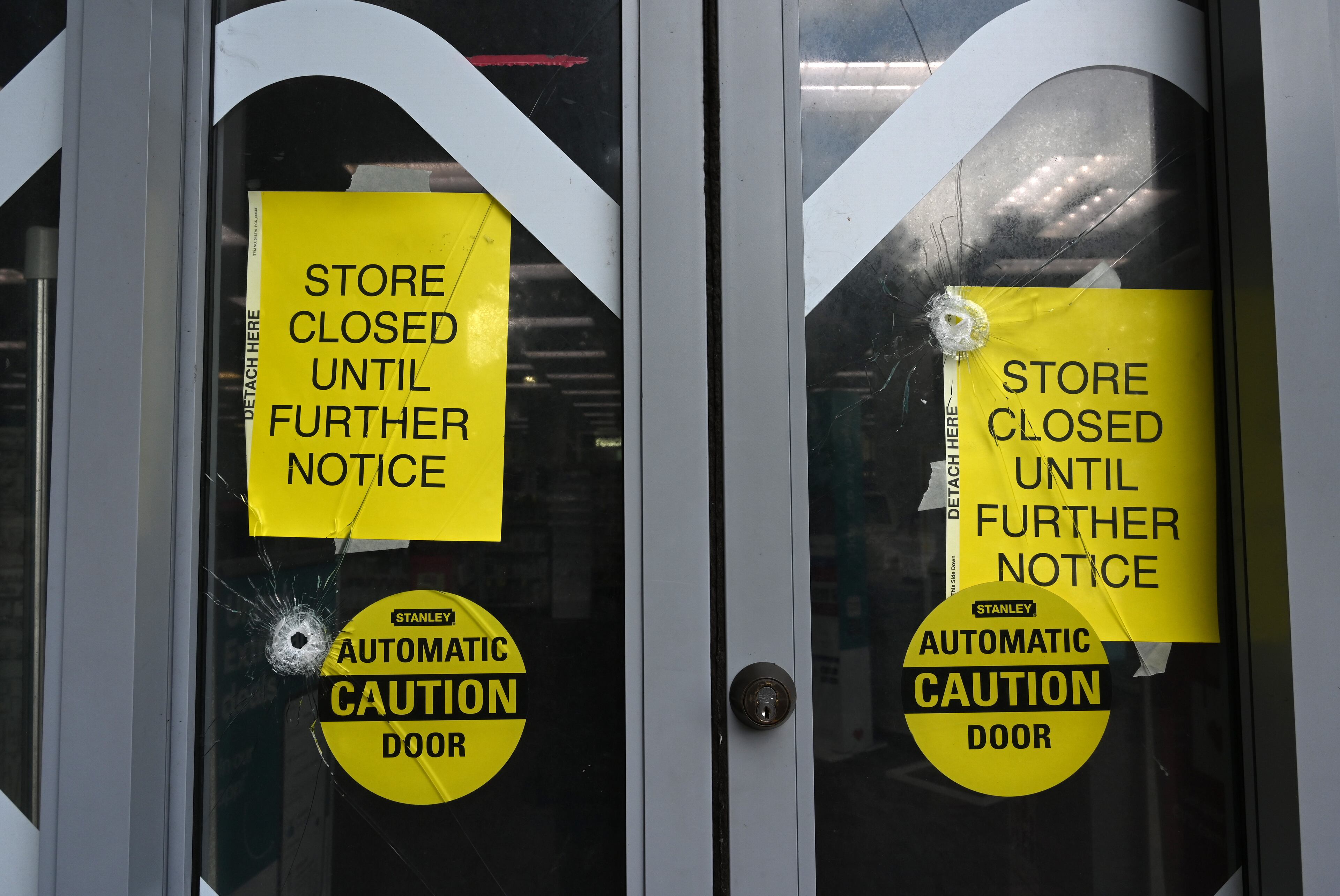CDC gunman might have been driven by mistrust of vaccines in deadly attack

The sound of rapid gunfire echoed across the Emory University campus. Dozens of bullets shattered windows at the Centers for Disease Control and Prevention. The smell of gunpowder hung in the air blocks away. Shell casings littered the ground.
The day after a gunman opened fire on the nation’s leading public health institution, authorities identified him as Patrick Joseph White of Kennesaw. While officials would not comment on a motive, one neighbor said White had a mistrust of vaccines and believed they had made him ill.
“He was very unsettled, and he very deeply believed that vaccines hurt him and were hurting other people,” said Nancy Hoalst, who lives directly across the street from the White family.
Hoalst said White raised the topic, even during conversations that were entirely unrelated.
White was found dead from an apparent gunshot on the second floor of a CVS building across the street from the CDC. They do not know whether his death was self-inflicted, Atlanta police Chief Darin Schierbaum said.
Throughout metro Atlanta, tributes poured in Saturday for DeKalb County police Officer David Rose. The first officer on the scene Friday, Rose was shot as a barrage of gunfire pelted his vehicle. He died of his injuries at Emory University Hospital.
The shooting left the nearby community reeling. The Clifton Road corridor is home to Emory and the CDC — an area with a high concentration of medical facilities and scientific research.
The CDC in particular has been struggling with budget cuts and layoffs under the Trump administration alongside a rising tide of anti-vaccine sentiment.

Another Georgia shooting
It was the second high-profile shooting at a federal institution in Georgia in the past week.
Just two days prior, on Wednesday, a U.S. Army soldier brought a personal weapon to his workplace on Fort Stewart and shot five members of his unit, authorities said. All survived, including the suspect, Sgt. Quornelius Radford, who was taken into custody at the scene.
“Twice this week, deranged criminals have targeted innocent Georgians. Each time, brave first responders rushed toward the danger to subdue the shooter and save lives, reminding us of just how crucial they are,” Gov. Brian Kemp said in a social media statement Friday.
Radford targeted his co-workers at the military base, citing racism he experienced while working there, The New York Times reported.
Both shootings took place at institutions facing significant changes and culture war pressures under the Trump administration.
Both prompted lockdowns and rapid law enforcement response. Both were significantly less deadly than initially feared.
Political hotbeds for controversy
The CDC and the U.S. military are under immense pressure amid major political shifts under the Trump administration.
The CDC faced significant layoffs and cuts from the federal government this year, along with rising scrutiny over vaccines under Health and Human Services Secretary Robert F. Kennedy Jr., who has pushed vaccine skepticism.
Protesters can often be seen outside the CDC Atlanta campus. Some protest in support of CDC workers who have faced cuts. Others protest the institution itself and its role in vaccine and other health recommendations.
Diversity, equity and inclusion efforts in the military have been abruptly halted under Secretary of Defense Pete Hegseth. Military installations once named to honor members of the Confederate army, changed to other names under the Biden administration, have been reverted to their original names under Trump — albeit honoring other veterans with the same names.
The political pressures on both institutions likely heightened tensions lingering beneath the surface, which came to a head in the shootings.

As vaccine skepticism rose during and after the COVID-19 pandemic, fewer Georgia children are getting fully vaccinated. Doctors are concerned about the state’s falling rates, which are well below national averages, the AJC recently reported.
Amy Cooter, an extremism expert and co-founder of the Institute for Countering Digital Extremism, said a violent attack centered on the Centers for Disease Control and Prevention is tragic but predictable.
Years of online rhetoric and conspiracy theories have significantly damaged the CDC’s reputation on the far right, she said.
“They pretty much believe it has no credibility,” she said. “Some of them believe it is actively working against the American people.”
Something seemed to change
Questions swirled around White on Saturday.
Neighbors described him as a handyman of sorts in his quiet west Cobb neighborhood, regularly mowing lawns, trimming shrubs and walking dogs for his neighbors. But in recent months, something seemed to change, Hoalst said.
She said he “emphatically believed” that vaccines had harmed him.
A man at White’s home declined interview requests Saturday morning.
The New York Times and CNN reported that the CDC shooter blamed his health ailments on the COVID-19 vaccine. They each quoted an unnamed official speaking on the condition of anonymity because of the ongoing investigation.
The Times also reported that the man’s father had reported him to authorities earlier on Friday, saying he was suicidal.
The FBI referred all questions from The Atlanta Journal-Constitution to the GBI, who declined to comment.
The White House did not immediately reply to a request for comment about the motive from the AJC.
Running toward danger
Meanwhile Rose, the DeKalb County officer, is being remembered as a hero.
A former U.S. Marine, 32-year-old Rose was the father of two children with another on the way, police said.
“These are individuals who run toward danger when we have the ability to run away,” DeKalb County CEO Lorraine Cochran-Johnson said.
Law enforcement from across metro Atlanta flooded the scene Friday evening. From Atlanta and DeKalb County police to Clayton County and Dunwoody officers, alongside FBI agents and U.S. Marshals, the response was swift and robust.
Officials praised the first responders’ swiftness in both shootings.
“This is why we train on active shooter drills around this region. This has been a group project and a coordinated effort,” Atlanta Mayor Andre Dickens said in a news conference Friday night.

As active shooter incidents rose in recent years, law enforcement response ramped up efforts to prepare officers and first responders for mass shootings and mass casualty events.
In the Fort Stewart shooting, soldiers immediately leaped into action: one tackled Radford and another subdued him until law enforcement could arrive, officials said. Others immediately treated the five wounded at the scene, relying on their recent mass shooter training they underwent five months prior and prior combat training.
“One of the things I can say unequivocally is that the fast action of these soldiers — under stress and under trauma and under fire — absolutely saved lives from being lost,” U.S. Army Secretary Dan Driscoll told reporters Thursday.

Follow the AJC’s coverage of the shooting at the CDC
A man opened fire on the Centers for Disease Control and Prevention on Friday, killing a police officer who tried to stop him, authorities said. Check back with the Atlanta Journal-Constitution for the latest breaking news, updates and insights on the developing news.
Here is the latest to catch up on:
Here’s how to help the family of the officer who was killed.
Live updates as details of the shooting emerged
Learn more about the officer: DeKalb officer killed in CDC shooting had close ties to Emory community
Watch: Police officer David Rose gave a moving speech at the DeKalb County Police Department’s graduation
A year of trauma: Shooting is yet another blow to CDC workers and alumni
A possible motive: CDC gunman might have been driven by mistrust of vaccines
Neighbors of CDC shooting suspect recall erratic behavior, no signs of violence
Watch: CDC shooter’s father called 911 multiple times the day of shooting
DeKalb officer becomes 4th from Georgia killed in line of duty this year
Reaction: Georgia politicians react to CDC shooting
Staff reporters Jason Armesto, Ariel Hart, Chris Joyner, Caroline Silva, Chaya Tong and Reed Williams contributed to this report




